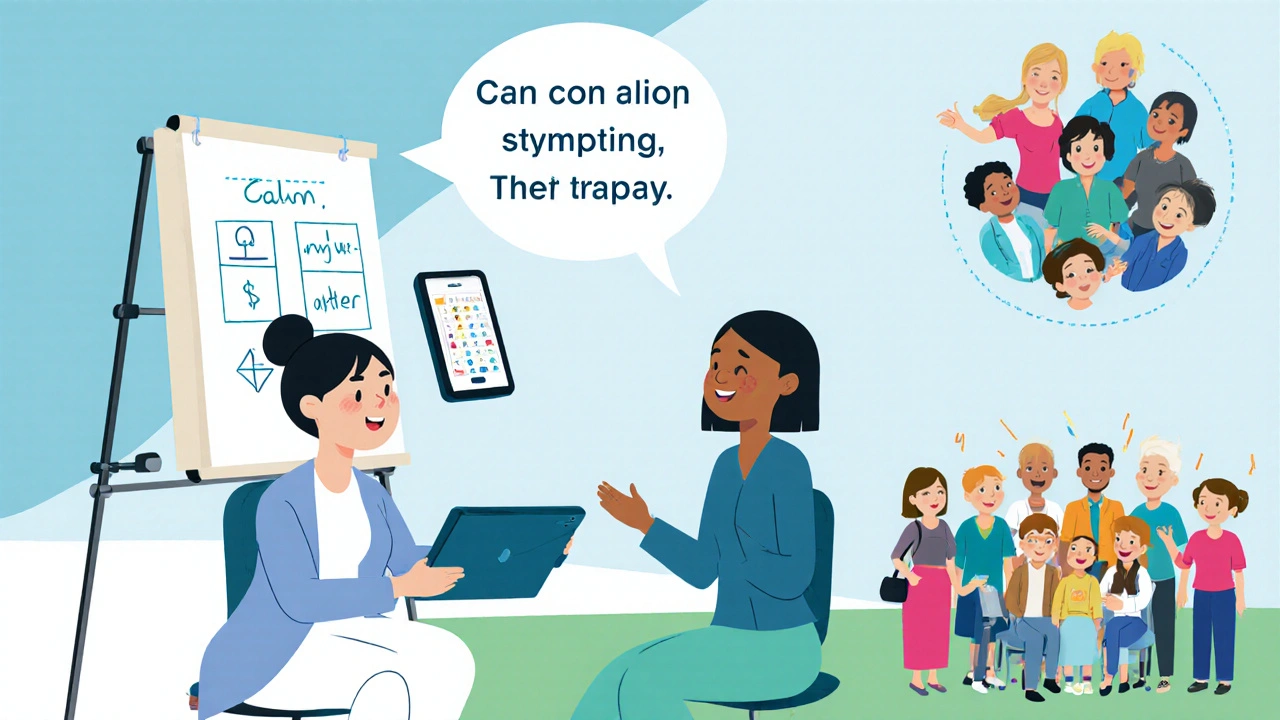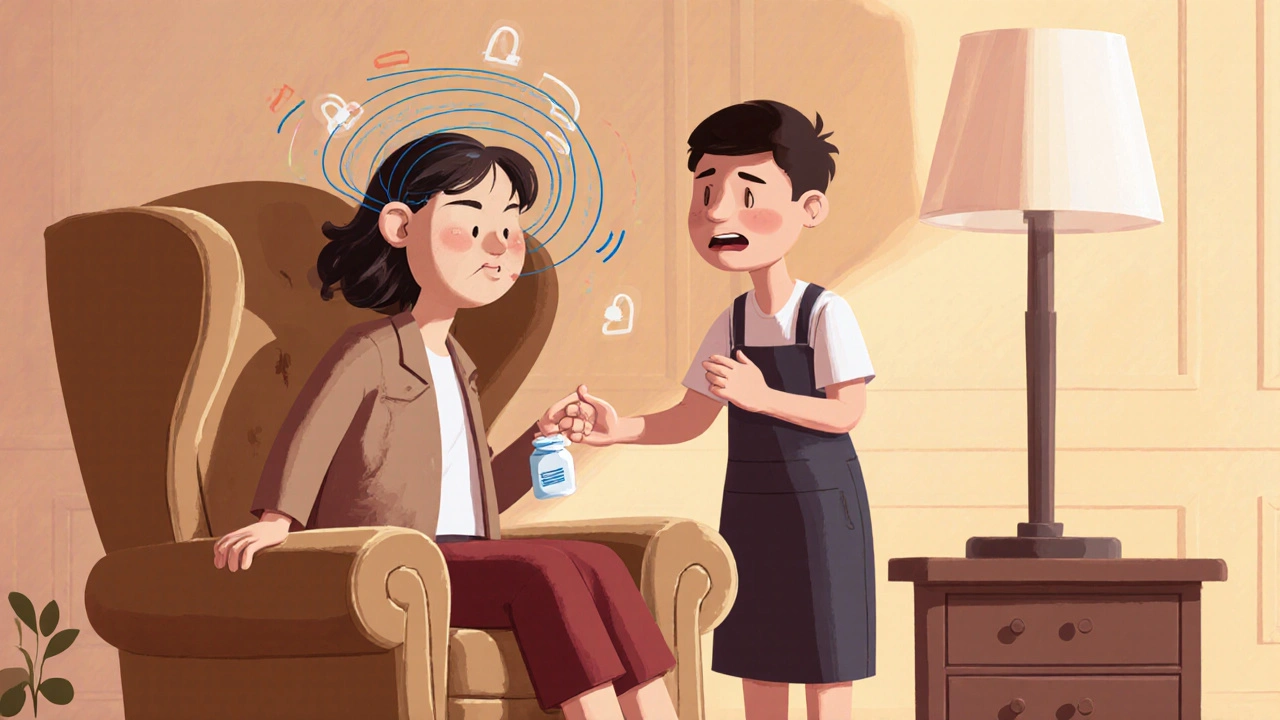When discussing Meniere's disease is a chronic inner‑ear disorder that causes episodes of vertigo, fluctuating hearing loss, and tinnitus, most people think about the dizziness or the ringing in the ears. What’s often missed is how those attacks ripple through a partner’s patience, a family’s routine, and a friend’s invitation to a night out.
Key Takeaways
- Sudden vertigo attacks can interrupt plans and create anxiety for both the patient and loved ones.
- Hearing loss and tinnitus affect communication, often leading to misunderstandings.
- Stress, depression, and fear of attacks are common emotional side‑effects that strain relationships.
- Proactive communication, flexible scheduling, and targeted coping strategies can preserve intimacy and social involvement.
- Professional support-counselling, vestibular therapy, and support groups-adds a safety net for couples and families.
Why Symptoms Turn Social Moments into Stressful Events
A typical Meniere’s episode starts with vertigo is a sensation of spinning that can last from minutes to several hours. The sudden loss of balance forces the person to sit or lie down, often in the middle of a conversation or a dinner out. Friends may feel awkward not knowing whether to stay or leave, while the patient worries about looking “silly.”
Next comes hearing loss is a reduction in the ability to hear certain frequencies, which can be temporary or permanent. Even a mild dip makes it hard to follow group chatter, especially in noisy restaurants. Coupled with tinnitus is a persistent ringing, buzzing, or hissing sound in the ears, the affected person may ask for repeated clarification, which can feel exhausting for everyone involved.
The inner ear is the part of the ear containing the cochlea and vestibular system, responsible for hearing and balance is essentially the epicenter of these symptoms. When fluid regulation (known as endolymphatic hydrops is an abnormal buildup of fluid in the inner ear that triggers Meniere’s attacks) goes awry, the whole sensory experience is thrown off balance.
All of these physical changes feed into a mental loop of stress is a physiological response to perceived threats that can heighten anxiety and affect coping and fear of the next episode. The emotional fallout is where relationships feel the most pressure.
Emotional Strain on Partners and Family Members
Partners often become informal caregivers without training. They learn to anticipate when an attack might happen, keep a bag of medication handy, and adjust plans at a moment’s notice. Over time, that vigilance can morph into resentment, especially if the patient downplays the severity or refuses to discuss coping options.
Children and elderly parents may feel helpless. A teenager might skip a weekend outing because the family can’t guarantee a “quiet” environment. Seniors may worry that the unpredictable dizziness will lead to falls, making them overprotective. Those dynamics can erode the sense of independence that both parties crave.
Studies from the British Otology Society (2024) show that couples where both partners actively discuss symptom patterns report a 30% lower rate of relationship dissatisfaction. Open dialogue turns a medical condition into a shared challenge rather than a hidden burden.

Keeping a Social Life When Vertigo Is Unpredictable
Friends assume you’ll be “fine” after a single episode, but the reality is that attacks can recur weeks later without warning. The key is flexibility:
- Plan low‑key gatherings. Choose venues with seating, good lighting, and easy bathroom access.
- Inform your group ahead of time. A quick text about potential dizziness lets others adjust expectations.
- Carry a “quick‑stop” kit. Include prescribed diuretics, anti‑nausea meds, and a small snack to stabilize blood sugar.
- Use the “buddy system.” Pair up with a friend who knows the signs and can help you exit gracefully if needed.
When you’re able to anticipate triggers-high‑salt meals, caffeine spikes, or sudden temperature changes-you can steer social plans toward safer options. For instance, a brunch at a quiet café beats a loud bar on a Friday night.
Communication Strategies for Couples
Effective communication is more than just telling your partner you’re feeling dizzy. It’s about setting a shared language for symptoms and coping mechanisms. Try these steps:
- Label the episode. Use a four‑word phrase like “Meniere’s attack now” to signal that you need immediate help.
- Share a symptom checklist. List the severity of vertigo (1‑10), hearing loss, and nausea. Your partner can gauge how urgent the situation is.
- Agree on a “pause” signal. A simple hand raise can let you pause a conversation without feeling embarrassed.
- Schedule debriefs. After a week, sit down and discuss what worked and what didn’t. Adjust future plans accordingly.
Couples who practice these techniques report less frustration and more confidence navigating social scenes.
Professional Support and Practical Tools
Medical treatment alone seldom resolves the relational fallout. Adding professional guidance fills the gaps:
- Vestibular rehabilitation therapy. Physical therapists teach balance exercises that reduce vertigo frequency, giving you more control over outings.
- Cognitive‑behavioral counselling. Therapists help both partners manage anxiety, reframe negative thoughts, and develop coping scripts.
- Support groups. Online forums like the Meniere’s Society UK let you exchange tips with others who understand the daily realities.
- Family education sessions. Some clinics offer short workshops for relatives, demystifying the condition and fostering empathy.
When you combine medication (e.g., diuretics) with lifestyle tweaks-low‑salt diet, regular exercise, adequate sleep-the overall attack rate can drop by up to 40% (American Academy of Otolaryngology, 2023). Fewer attacks mean fewer interruptions, which naturally eases relational tension.

Quick Checklist: Protecting Your Relationships and Social Life
- Talk openly about symptoms and triggers with loved ones.
- Keep a symptom‑tracking app to share real‑time updates.
- Plan activities with easy exit routes and seating.
- Carry medication and a snack wherever you go.
- Schedule regular vestibular therapy and counselling sessions.
- Join a support group for both patients and partners.
- Review your diet monthly-reduce salt, caffeine, and alcohol.
- Set a monthly “relationship check‑in” to discuss what’s working.
Table: Coping Strategies vs. Relationship Impact
| Strategy | Typical Benefit | Potential Relationship Upside |
|---|---|---|
| Low‑salt diet | Reduces attack frequency (≈30%) | Fewer emergency cancellations → more reliable plans |
| Vestibular rehab | Improves balance confidence | Partner feels less need to constantly monitor |
| Joint counselling | Builds communication skills | Both parties feel heard, lowering resentment |
| Support‑group participation | Provides peer advice | Shared experiences reduce isolation for both |
Frequently Asked Questions
Can Meniere’s disease cause permanent relationship damage?
If left unaddressed, the stress and miscommunication that build up over time can erode trust. However, proactive coping-open dialogue, professional support, and lifestyle adjustments-often restores or even strengthens the bond.
What are practical ways to tell friends I might need to leave early?
A short text like “Meniere’s could flare, I might head out early” sets expectations without drama. Pair it with a pre‑agreed signal-such as stepping outside for fresh air-so you can leave gracefully.
Should my partner attend my medical appointments?
Having a partner present can improve understanding of treatment options and give them a chance to ask questions. Many clinics offer a “family education” slot specifically for this purpose.
How does anxiety from Meniere’s affect social interactions?
Anticipatory anxiety may cause you to decline invitations, creating a feedback loop of isolation. Cognitive‑behavioral techniques-such as exposure planning and thought restructuring-help break that cycle.
Are there any apps that help track symptoms for my partner?
Apps like "Meniere’s Tracker" let you log vertigo intensity, hearing changes, and trigger foods. The data can be shared via email or QR code, giving your partner a clear picture of patterns.









Oh sure, just pop a pill, wave a magic wand, and your social life is back to Netflix‑marathon level-because Meniere’s is totally a one‑click fix. In reality, you’ve got to juggle meds, diet, and a partner who’s learning to become a part‑time nurse while still trying to remember your anniversary. The key is not pretending the world’s a smooth cruise ship; it’s about mastering the art of strategic bail‑outs and keeping the drama to a minimum. Think of it like a tactical video game: you scout the arena, spot the loud bars, and deploy the “quiet corner” power‑up before the vertigo boss appears. If you can pull that off, you’ll stop the whole crew from muttering “what’s wrong with them?” and start hearing more “we’ve got your back” instead.
Thanks for laying out those practical steps so clearly! I love how you emphasized the buddy system and low‑key venues-those tiny tweaks can totally change the vibe from stressful to enjoyable. It’s also great to hear that regular check‑ins with a partner can shave off a lot of the anxiety that builds up over time. I’ve seen friends who started using a simple “pause” hand signal feel a lot more in control during outings, and it’s amazing how quickly the atmosphere relaxes. Keep spreading these ideas; every little bit helps someone keep their social circle intact.
Listen, folks, the whole “medical community” thing is a façade, a grand‑scale experiment, designed to keep us dependent on expensive drugs, endless appointments, and a never‑ending cycle of fear, ; they promise “relief” but deliver only more paperwork, more prescriptions, more anxiety, ; the truth is hidden behind glossy brochures, ; don’t be fooled, ; they want you to believe that without their “expertise” you’re doomed, ; well‑you’re not, ; take control, ; track your symptoms, use community support, and stop giving them the power to dictate your life, ;.
While I appreciate the passion, the argument oversimplifies a complex otologic condition and neglects rigorous clinical evidence. A nuanced discussion would weigh both therapeutic advances and patient autonomy without resorting to hyperbole.
🧭 Navigating the labyrinth of Meniere’s management truly feels like charting a philosophical sea, where each wave of vertigo prompts a deeper inquiry into the self and the relational tides that surround us. First, acknowledge that the inner ear is not merely a mechanical organ but a gateway to perception, and when its fluid balance wavers, the ripple effects touch every facet of daily life. Second, foster a partnership built on transparent language; a simple phrase like “Meniere’s spike incoming” serves as both a warning beacon and a compassionate handshake across the uncertainty. Third, integrate vestibular rehabilitation not just as a set of exercises but as a mindful practice that strengthens proprioceptive confidence, allowing you to stand tall even when the world spins. Fourth, consider cognitive‑behavioral techniques as a toolbox for reframing anxiety, turning “what if” catastrophizing into “how can I adapt” problem‑solving. Fifth, harness technology-symptom‑tracking apps become shared journals, granting both partners a clear map of triggers, frequencies, and progress over weeks and months. Sixth, schedule regular debrief sessions, perhaps over a cup of tea, to discuss what strategies succeeded, which fell short, and where adjustments are needed, thereby preventing resentment from silently accruing. Seventh, remember that dietary modifications, such as a low‑salt regimen, are not punitive restrictions but empowering choices that can reduce attack frequency by up to thirty percent, as recent otology studies suggest. Eighth, make space for social flexibility: choose venues with seating, quiet corners, and easy exits, turning potential crisis points into comfortable havens. Ninth, involve your broader support network-friends, family, and peer groups-so the caregiving load does not fall solely on one partner, preserving autonomy for both. Tenth, celebrate small victories; each successful outing without a flare is a testament to collaborative resilience. Finally, blend compassion with pragmatism, recognizing that while the condition imposes constraints, it also offers an invitation to deepen intimacy through shared coping rituals. 🌟 By weaving these threads together, couples can transform a medical challenge into a catalyst for stronger relational bonds and a richer, more intentional social life.
Look, the Indian medical system knows this stuff better than any Western “guideline” you’ll read online. Our ENT specialists have been using low‑salt diets and vestibular rehab for decades, and families here rally around the patient without whining about “individual freedom.” If you want real results, stop obsessing over trendy apps and start embracing the community‑center support groups that have been saving marriages for generations.
Ah, the melodramatic glorification of “traditional” practices! While you parade cultural nostalgia, you ignore the nuanced biopsychosocial model that integrates pharmacodynamics, neuroplasticity, and psychosomatic feedback loops. Your reductionist stance reduces a multifactorial vestibular pathology to a simplistic “family rally” narrative, which, frankly, is academically careless. A rigorous approach demands evidence‑based multimodal therapy, not just a nostalgic rally cry.
From a philosophical perspective, Meniere’s can be seen as an embodiment of the ancient Stoic exercise: confronting the uncontrollable and mastering our internal response. By reframing each vertigo episode as a reminder of impermanence, we can cultivate resilience that extends beyond the clinic and into everyday interactions. This mindset, paired with practical coping tools, creates a holistic framework for thriving despite physiological limitations.
Indeed, the synthesis of Stoic reflection with contemporary therapeutic modalities offers a compelling paradigm. While the philosophical reframing provides existential solace, empirical interventions such as vestibular rehabilitation and dietary regulation furnish tangible benefits. It is the convergence of these domains that yields the most robust outcomes for patients and their partners.
Great advice! 😊